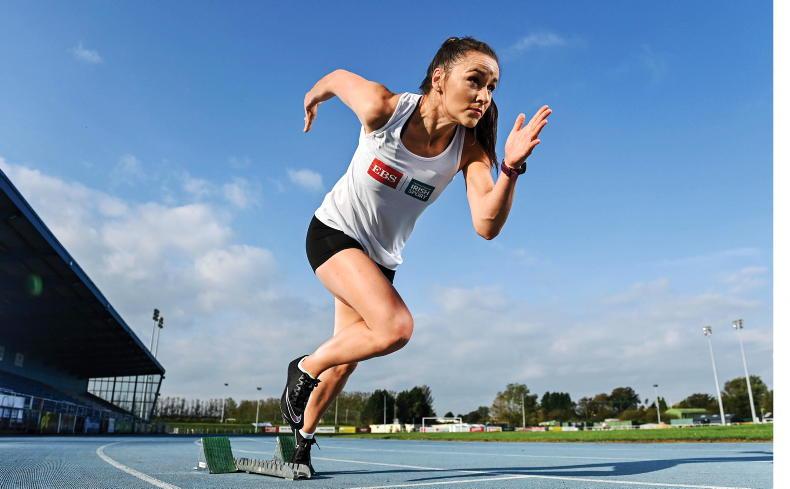This Saturday, 23 January, is exactly six months from the beginning of the rescheduled 2020 Olympic Games.
The name might confuse, but, like soccer’s European Championship, the organisers retained the original moniker when the event had to be postponed by a year due to COVID-19 – if we were cynical, we’d think it was because of all the signage and branding already in place, featuring 2020 prominently.
By this juncture, one would normally expect more clarity for the athletes with designs on taking part, but of course ‘normal’ has been a word sadly absent for far too long. So it is that Cork sprinter Phil Healy, hoping to compete in the 200m, is still somewhat in limbo.
There are 56 places up for grabs in the competition for Tokyo and currently the Ballineen native is ranked 25th.
With qualification frozen from last April until the beginning of December, it means that opportunities to post qualifying times have been limited, but the re-opening of the process hasn’t necessarily meant a huge change, as athletics doesn’t fall under the Government’s ‘elite’ categorisation needed for sport to take place under level-five restrictions.
Missed opportunities
“It’s a hard position at the moment for athletes and coaches,” Healy says.“We have the European indoors, which are due to go ahead in the first weekend in March in Poland.
“I have the standard from last year, so I’m in a good position but, at the same time, we need to race.
“The nationals are scheduled for a month’s time but, based on everything that’s going on, we may not get the exemption for them to go ahead, which is frustrating for us as athletes, given that other sports’ events have been held.
“For one, it contributes to qualification for European indoors, as well as the Olympics. The fact that GAA, for example, can go ahead even though it has nothing like the same international dimension as the Olympics, that is very frustrating for the athletes.”
“We can go abroad to compete but, again, travel brings so much risk.
“You see all these other countries that are hosting their competitions and giving the athletes the opportunity, but here in Ireland nothing is being pushed and there’s no creativity in terms of finding solutions.
“It’s just hard because we’re behind. Even when we were in the best position in Europe in terms of [coronavirus] cases, still nothing was put in place. Now we’re one of the worst and it looks like [the nationals] will be scrapped.
“You see all of these COVID-19 press conferences going ahead every day and there are more people at them than athletes that would be at the nationals.
“Sport is obviously down on their radar but, at the same time, it’s the Olympics on the line and they’re going ahead, as of now, and we have to prepare for that.”
In 2018, Healy became the first Irish female athlete in four decades to hold the national 100m and 200m records. Having initially studied nursing for three years in University College Cork (UCC), the 12-hour shifts as a student nurse took their toll and she enrolled in a computer science Master’s degree in Waterford IT. Currently, she is doing an add-on module in project management in Cork IT.
The COVID-19 pandemic brought about an unplanned break in her hectic training schedule, but that was no bad thing, either.
“It became a year of ticking over, but it gave a new window of opportunity to work on things that we mightn’t have had time for before that.
“That was great in a way. I’d been going full-on pretty much since 2013, which brings an awful lot of pressure. It’s hard to keep going, so that allowed me to reset in ways and not have to have the same intensity in training.
“That helped me to re-focus coming into this season.”
Tokyo hopes
While the 100m and 200m have been her strongest areas, in 2016 she produced an incredible finishing leg in the 4x400m relay to win the national inter-varsity title for UCC. Naturally, it’s the fast finishes that she is looking to work on for Tokyo.
“For me, and I think for every athlete, it’s always about finishing better,” she says, “because it’s the area where you can make the most improvement.
“That’s where it comes down to holding your composure and getting that bit ahead of the athletes that don’t have the strength to cope over the last few metres.
“I’ve figured out a lot of things over the last year with Shane McCormack, my coach, that work and that don’t work for me. It was a good opportunity and we can bring that into this year, now.”
A lot of effort goes into running at full pelt for 20-odd seconds.
“Shane looks over the whole programme,” Healy says, “but Ciara Losty, my sports psychologist, played a big role during lockdown because, obviously, it was a difficult time for everybody and you have to adapt.
“She was there and she checked in with me an awful lot. With something new like that, everybody is going to react in different ways, so it’s just about having that sounding board.
“Working with Shane then is the key because he’s the person I see every day and he knows the ins and outs of it. He’s the leader of the whole thing and everything else is an accessory to that.”
And, while winning gold is the ultimate aim, she is level-headed enough to rationalise what would constitute a successful Olympics.
“For me, it’s definitely getting to a semi-final, which would be the top 24,” she says.
“Obviously, the Olympics is the pinnacle of anyone’s career – it’s the best of the best in the world.
“So, if 56 of the world’s best are selected, then to reach a semi-final would be a good achievement.”









SHARING OPTIONS